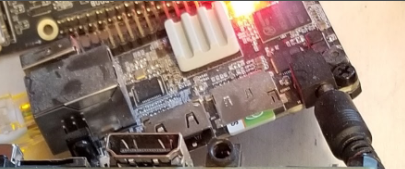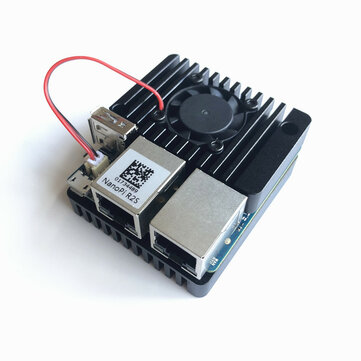
devman
-
Posts
64 -
Joined
-
Last visited
Content Type
Forums
Store
Crowdfunding
Applications
Events
Raffles
Community Map
Posts posted by devman
-
-
Sorry to wander off-topic, but is that a ceramic heatsink?

-
-
Well, if you wanted to go minimalist,
you could probably solder pin headers to J13and then hang an esp8266 off it using something like the esp-link firmwareEdit: sorry, was thinking of the Helios4. The Helios64 would use P14 and it's already populated, so no soldering required. Then you'd just need to pick up vcc/gnd from the gpio connector to power the device.
*note: I haven't actually tried this
-
In Hong Kong. Thanks!
-
Since the original (Helios4) is EOL and the new Helios64 is backordered waiting for a second production run, I know the odds are low, but.. do you have any (bare board or full kit) available for replacement/purchase/whatever? After it being rock solid for so long, I kinda redesigned my network around centralized storage and it's a bit of a pain atm.
Thanks
-
with all the drives removed, I get:
5v reads 5.05v
12v reads 12.10v
with 2 drives on one connector, the remaining connector reads:
5v reads 5.05v
12v fluctuates between 10.3 & 11.9v
-
armbianmonitor -u: http://ix.io/2Lae
Did an apt update/upgrade & reboot today, and the system came back up but none of the drives did. Imaged a new SD card with stock armbian, and still no luck.
Measured the voltage of the PS (at the plug, not the molex connector) at 12.3v
Anything else I can check/try?
-
The problem is that the holes don't leave enough clearance to rotate those (at least on mine), so I just went with slightly longer screws and washers/bushings
-
On 11/1/2020 at 2:54 AM, M.FB said:
I'm pretty sure you don't actually want the fan flat, as there's nowhere for the air to go then.
I ended making some little 2mm bushings and swapping out for longer screws. I need to source a better fan still. -
On 10/21/2020 at 2:26 AM, M.FB said:
I have a style-A case on my R2S, and the device idles at ~50c. It works better if you can slightly shim the fan up away from the case, as their design has the fan blowing directly against a flat metal heatsink with no exit route for the air.
I'd note that that tiny fan is very noisy.
-
3 minutes ago, Igor said:
40-47° with IR meter on the surface of yellow box. Running at 600, idle, CPU temp reported 70°. Going down to 408 ... CPU temp remains 68-70°. Applied force cooling for a while drops to 65°, casing stays below 40° and I will update later ...Numbers look not far from where I am now. R2S says 64c, Cheap IR thermometer on the underside of the PCB gives me 48-50c, thumb says "ouch", and I can't get a reliable reading off the heatsink.
Temp here is 30c ambient
-
Looks it's reacting correctly compared to the settings it's being fed.
james@r2s:~$ cat /etc/default/cpufrequtils ENABLE=true MIN_SPEED=600000 MAX_SPEED=1390000 GOVERNOR=ondemand james@r2s:~$ cat /sys/devices/system/cpu/cpu*/cpufreq/scaling_governor ondemand ondemand ondemand ondemand
-
Idle temps drop by ~10c without the enclosure. No issues with connections between the heatsink and the cpu.
No enclosure, thermal pad:
_ _ _ ____ ____ ____ | \ | | __ _ _ __ ___ _ __ (_) | _ \|___ \/ ___| | \| |/ _` | '_ \ / _ \| '_ \| | | |_) | __) \___ \ | |\ | (_| | | | | (_) | |_) | | | _ < / __/ ___) | |_| \_|\__,_|_| |_|\___/| .__/|_| |_| \_\_____|____/ |_| Welcome to Armbian Bionic with Linux 5.4.45-rockchip64 System load: 0.00 0.00 0.00 Up time: 33 min Memory usage: 17 % of 472MB IP: 169.254.9.92 192.168.86.36 CPU temp: 61°C Usage of /: 4% of 29G [ General system configuration (beta): armbian-config ] Last login: Sat Jun 13 02:52:34 2020 from 192.168.86.28 james@r2s:~$ sudo -s [sudo] password for james: root@r2s:~# armbianmonitor -m Stop monitoring using [ctrl]-[c] Time CPU load %cpu %sys %usr %nice %io %irq CPU C.St. 03:13:31: 600MHz 0.00 0% 0% 0% 0% 0% 0% 59.5°C 0/6 03:13:36: 600MHz 0.00 0% 0% 0% 0% 0% 0% 58.6°C 0/6 03:13:41: 600MHz 0.00 0% 0% 0% 0% 0% 0% 58.6°C 0/6 03:13:46: 600MHz 0.00 0% 0% 0% 0% 0% 0% 58.2°C 0/6 03:13:52: 600MHz 0.00 0% 0% 0% 0% 0% 0% 57.7°C 0/6 03:13:57: 600MHz 0.00 0% 0% 0% 0% 0% 0% 58.2°C 0/6 03:14:02: 600MHz 0.00 0% 0% 0% 0% 0% 0% 57.7°C 0/6No enclosure, copper shim:
_ _ _ ____ ____ ____ | \ | | __ _ _ __ ___ _ __ (_) | _ \|___ \/ ___| | \| |/ _` | '_ \ / _ \| '_ \| | | |_) | __) \___ \ | |\ | (_| | | | | (_) | |_) | | | _ < / __/ ___) | |_| \_|\__,_|_| |_|\___/| .__/|_| |_| \_\_____|____/ |_| Welcome to Armbian Bionic with Linux 5.4.45-rockchip64 System load: 0.00 0.00 0.00 Up time: 30 min Memory usage: 17 % of 472MB IP: 169.254.11.84 192.168.86.36 CPU temp: 59°C Usage of /: 4% of 29G [ General system configuration (beta): armbian-config ] Last login: Sat Jun 13 03:13:22 2020 from 192.168.86.28 james@r2s:~$ sudo -s [sudo] password for james: root@r2s:~# armbianmonitor -m Stop monitoring using [ctrl]-[c] Time CPU load %cpu %sys %usr %nice %io %irq CPU C.St. 03:47:30: 600MHz 0.07 0% 0% 0% 0% 0% 0% 55.5°C 0/6 03:47:35: 600MHz 0.07 0% 0% 0% 0% 0% 0% 54.6°C 0/6 03:47:40: 600MHz 0.06 0% 0% 0% 0% 0% 0% 56.8°C 0/6 03:47:46: 600MHz 0.06 0% 0% 0% 0% 0% 0% 56.4°C 0/6 03:47:51: 600MHz 0.05 0% 0% 0% 0% 0% 0% 56.4°C 0/6 03:47:56: 600MHz 0.05 0% 0% 0% 0% 0% 0% 56.4°C 0/6 03:48:01: 600MHz 0.04 0% 0% 0% 0% 0% 0% 57.3°C 0/6 -
Quote
71C / 2.5W / 600Mhz idle
85C / 3.7W / 1000Mhz under load (stress -c 4)
I'm seeing similar results on my unit, although mine throttled a bit further (816 MHz @15 minutes) if you leave it running.
In that little case with token ventilation holes, there's just nowhere for the heat to go.I'll retest tonight without the case.
-
1 hour ago, Werner said:
Armbian ships a different driver for XR819 since quite a while. No idea though how much this increases the stability of WiFi since I never used it.
My mistake. I saw messages about an updated driver but thought it hadn't made it into the releases yet.
-
Last I checked, wifi on the Zero was disabled by default due to quality issues (I did see some recent patches for it on github, but I don't _think_ armbian has them up)
I've had decent luck with the FriendlyArm stuff. If you only need wifi, then take a look at the NanoPi duo 2 -
I had a similar problem on one of my boxes. Turns out that Speedtest was at fault.
From Ookla:
QuotePerformance - all of the open source versions use an ancient version of our test engine that predates our Flash test. Yeah it's that old. This is not ideal for fast connections. We've also seen popular versions that are impacted by DNS timings and all sorts of other methodology issues. In addition, most are written in high level languages, which typically have issues hitting high bandwidth levels.
You can get a modern version for your platform from https://www.speedtest.net/apps/cli
-
5 hours ago, gprovost said:
OMV5 is officially stable, therefore you should go for Armbian Buster.
FYI Armbian will release soon 20.05 version ;-)
Thanks, I'll just wait then
-
On 4/9/2020 at 4:14 PM, gprovost said:
@devman your boot env file is corrupted, maybe there is other thing no correct in your system. So time to do a fresh install.
Thanks, I made a fresh SD card and no problems for 2 weeks now.
Is Stretch / OMV4 still the recommended software, should I be using Buster / OMV5?
-
7 hours ago, gprovost said:
Yup most probably not related to marvell_xor, just a coincidence. Because yes we have 2 users (it includes you) who see the crash and don't have RAID 5 or 6 setup.
There was some changes back in Jan that were related to DVFS. We need to re look at it.
Sorry, haven't had a chance to get back to this. My system is running a 3-disk btrfs / raid 5
-
24 minutes ago, gprovost said:
Hmmm it reboots but not hangs ? That is strange. How long in total have you been running your Helios4 for ?
Just in case, do you have watchdog service running ? ( systemctl status watchdog.service ) Just trying to eliminate software issue.
Oh, definitely reboot. The way I first noticed it was the sound of the fans all spinning up to 100%
It's one of the first batch units, so ~2 years now. Current uptime is a few hours since the last failure.
● watchdog.service - watchdog daemon Loaded: loaded (/lib/systemd/system/watchdog.service; enabled; vendor preset: enabled) Active: active (running) since Wed 2020-04-01 02:17:21 HKT; 10h ago Process: 2232 ExecStartPre=/bin/sh -c [ -z "${watchdog_module}" ] || [ "${watchdog_module}" = "none" ] || /sbin/modp Process: 2234 ExecStart=/bin/sh -c [ $run_watchdog != 1 ] || exec /usr/sbin/watchdog $watchdog_options (code=exited, Main PID: 2236 (watchdog) Tasks: 1 (limit: 4776) Memory: 708.0K CGroup: /system.slice/watchdog.service └─2236 /usr/sbin/watchdog Apr 01 02:17:21 helios4 watchdog[2236]: interface: no interface to check Apr 01 02:17:21 helios4 watchdog[2236]: temperature: no sensors to check Apr 01 02:17:21 helios4 watchdog[2236]: no test binary files Apr 01 02:17:21 helios4 watchdog[2236]: no repair binary files Apr 01 02:17:21 helios4 watchdog[2236]: error retry time-out = 60 seconds Apr 01 02:17:21 helios4 watchdog[2236]: repair attempts = 1 Apr 01 02:17:21 helios4 watchdog[2236]: alive=/dev/watchdog heartbeat=[none] to=root no_act=no force=no Apr 01 02:17:21 helios4 watchdog[2236]: watchdog now set to 60 seconds Apr 01 02:17:21 helios4 watchdog[2236]: hardware watchdog identity: Orion Watchdog Apr 01 02:17:21 helios4 systemd[1]: Started watchdog daemon. -
When I write large files (intermittently) the system will spontaneously reboot.
I don't know if it's related, but I've also noticed that often, when copying from windows over to the NAS, the throughput will drop fairly quickly to 0, stay there for a minute or so, and then shoot back up
I checked the power supply and it's giving me ~12.5v
-
On 1/3/2020 at 7:20 PM, manuti said:
Anyone having this board.
Can trans-code video using as Plex Server?
Thanks.
Probably, depending on your content type and target device. I did some rudimentary testing with transcoding on the NanoPi M3, and it technically worked.
I had stability issues though, so I switched to a small/cheap x86 box that supported hardware transcoding.
-


[WTB] [ASIA] FriendlyElec NanoPi NEO2
in Market place
Posted
You should be careful about revisions. I actually bought their metal OLED case only to find that it doesn't fit the older NEO2's.
I ended up printing a modified version of the lower half of their case to match.